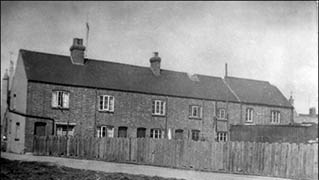|
John Croxen was a publican and a tile and brick maker who built or owned several properties in Burton Latimer that included Croxen's Long Row and the 'Salt Box Cottages' in Croxen's Yard. After his death, his family inherited much of his wealth and property in the High Street area. His second daughter Ann Croxen married William Brown, also a publican, who took over her father's pub, the Duke's Arms, and subsequently built six houses in Croxen's Yard to replace the Salt Box Cottages and Brown's Row in Pigott's Lane. William Brown died in about 1874. His youngest daughter Susannah never married and lived with Ann at the Duke's Arms and afterwards in Pigott's Lane, Duke Street, where they kept a grocer's shop, and Alexandra Street. Ann's son, Thomas Bland Brown, described as 'Gentleman' (at the age of 18!) in the 1891 census, aided and abetted by his mother, seems to have been over-ambitious in his business dealings which landed them both in court as can be seen below.
DEFRAUDING A SISTER - Northampton Mercury 18 August 1905
A case of a somewhat extraordinary character was heard before his Honour Judge Sir T.W. Snagge at the Kettering County Court on Tuesday, when Susannah Croxen, spinster, of Burton Latimer, sued H. Ingle and Son, leather merchants, Leeds and Kettering, for the return of a life assurance policy held by the defendant firm. ~ Mr. E.T. Toller appeared for the plaintiff, and Mr. Parsons (Leicester) represented the defendants, whilst Mr. Pratt (London) watched the case on behalf of the Prudential Assurance Co. ~ The case had previously been before the Court, and was adjourned for the attendance of Bland Brown, a nephew of the plaintiff, who was alleged to have disposed of the plaintiff’s assurance policy to the defendants as security for leather purchased by him from the defendants. ~ The plaintiff, a decrepit old lady, was unable to enlighten the Court as to the disposal of the policy, which had been taken out in 1886. She lived with her sister, Mrs. Brown, at Burton Latimer, and did not know that the policy was missing until informed by her sister, who said she was unable to account for its disappearance. ~ The plaintiff said that her sister, Mrs. Brown, kept her on money due to her as life interest in her father’s property. Mrs. Brown was the first to miss the policy, and they then said that the policy was in the hands of the defendant firm. ~ Mrs. Brown stated that her sister had a life interest in some property left by her father, with the provision that in the event of marriage she was to receive £300. Witness had paid the assurance premiums out of that life interest, which would produce from £50 to £60 per annum. Witness had kept plaintiff out of that sum. On the day the policy was parted with her son came home, and said that Mr. Ketcher, the local manager for the defendants, was pressing for some security, and fetched three life policies downstairs. Two of those policies were on the life of her son, and the other was on the life of the plaintiff. Witness did not tell Miss Croxen what they proposed doing with her policy. She knew she was to blame for parting with it, but her son said that they would soon be able to redeem the policies when trade picked up. ~ Mr. R.N. Ketcher, the local manager for the defendant firm, stated that he opened an account with the firm of Dicks and Brown, at Burton Latimer, in May, 1903, and trusted them up to £70 or £80. The firm wanted further supplies of leather, but he refused unless he had some security. On October 30 Mrs. Brown, and her son came to the Kettering warehouse, and offered three policies as security. He never saw the policies, which were sent direct to the head office at Leeds. Mrs. Brown told him that two of the policies referred to her son, and that the other policy was on the life of her sister, which she (Mr. Brown) took out in favour of her son. Neither Mrs. Brown nor her son ever told him that the policy in dispute did not belong to them. ~ In the correspondence which was read, the witness Ketcher said “that Mrs. Brown and her son were very cunning people, but knew no more of business than the man in the moon.” (Loud laughter.) ~ Ketcher admitted that the policy was never assigned to the Browns, although he had repeatedly asked them to try and get that done. ~ In cross-examination by his Honour, Mrs. Brown admitted that when her sister was very ill she wrote to defendant firm in her sister’s name and offered £10 for the return of the policy.
The 'Yorkshire Post and Leeds Intelligence' also covered the case and described this part of the proceedings thus:
... Miss Croxen said that she never written a letter to the defendants claiming the policy.
A letter was handed to his Honour, who, having perused it, said: This is your letter, Mrs. Brown.You wrote it?
Mrs. Brown: Yes.
His Honour: You signed it "S.M.Croxen"? ~ Yes, my sister was ill, and could not sign it.
His Honour: So as the policy was deposited with Messrs. Ingle, you thought you would get it back, and do them out of the £100. It is quite a delightful history. You offered £10 to the firm if they would only be good enough to send it back. (Laughter)...
Summing up, his Honour said he had received the greatest possible assistance from the Prudential Assurance Company, who had acted throughout with the utmost business-like integrity. The company had come forward and largely helped in un-ravelling this trumpery fraud. He was convinced the plaintiff had no knowledge of the disposal of the policy and never authorised it. The defendants had paid two premiums, and they were entitled to a return on that money. The policy must be returned by the defendants, who would also pay the costs of the action. He would, however, direct that the policy and the letter written by Mrs. Brown in her sister’s name, and without her authority, be retained for the present by the Registrar of the Court. There had been a fraud in connection with the matter, but he could not say how far the fraud was beyond the Civil Court procedure. Mrs. Brown was an old woman and probably yielded to the entreaties of her son.
|

